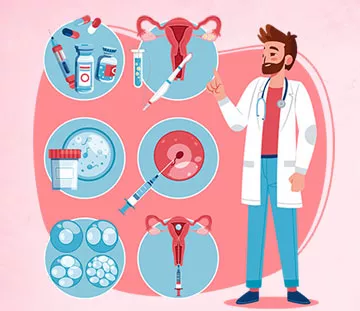Introduction to Types of IVF
In vitro fertilization (IVF) has helped countless couples overcome infertility and achieve parenthood. However, types of IVF treatments are not limited to a single method. With advances in technology, several approaches have emerged, enabling fertility experts to address various challenges effectively. Understanding the different types of IVF can simplify decision-making for couples.
Types of IVF Based on Fertilization Method
1. Conventional IVF
- Suitable for couples facing tubal damage, ovulation disorders, or unexplained infertility.
- Oocytes are retrieved following ovarian stimulation and fertilized in a laboratory using suitable culture media.
- Recommended for those with no severe male infertility issues.
2. Intracytoplasmic Sperm Injection (ICSI)
- A single sperm is injected directly into the egg.
- Indicated for severe male infertility cases, such as low sperm count or motility issues.
- Often used for couples with repeated fertilization failures in conventional IVF.
Types of IVF Based on Ovarian Stimulation
1. Mini IVF
- Utilizes lower doses of hormonal medication to stimulate the ovaries.
-
Produces fewer eggs but of higher quality, making it ideal for women with low ovarian reserve.
2. Natural Cycle IVF
- Relies on the woman’s natural ovulation cycle without hormonal stimulation.
-
Focuses on retrieving a single egg, offering a minimally invasive approach.
Types of IVF Treatment Based on Embryo Transfer
1. Fresh Cycle IVF
- Embryos are transferred into the uterus immediately after fertilization.
- Recommended for couples with no prior fertility treatments.
2. Frozen Embryo Transfer (FET)
- Embryos are frozen and transferred later.
-
Beneficial for patients requiring pre-treatment or to avoid ovarian hyperstimulation.
3. Routine Single Embryo Transfer (rSET)
- Involves transferring a single embryo to reduce the risk of multiple pregnancies.
4. Double Embryo Transfer
- Two embryos are transferred to improve success rates, often used in women with repeated implantation failures.
Advanced Techniques in IVF Treatment Type
Advanced methods enhance the success rates of IVF and cater to specific challenges.
1. Preimplantation Genetic Testing (PGT)
- Tests embryos for genetic abnormalities before transfer.
- Ideal for couples with a history of genetic disorders or recurrent miscarriages.
2. Laser-Assisted Hatching
- Facilitates embryo implantation by thinning the zona pellucida using laser technology.
- Improves pregnancy outcomes, particularly in frozen embryo transfers.
3. Endometrial Receptivity Array (ERA)
- A biopsy of the endometrial lining determines the optimal implantation window.
- Recommended for women with recurrent implantation failures.
4. Ovarian Rejuvenation with PRP (Platelet-Rich Plasma)
- PRP is injected into the ovaries to enhance ovarian reserve.
- Suitable for women with diminished ovarian function.
Comparing Key Characteristics of IVF Treatment Types
Each type of IVF has unique characteristics, tailored to specific fertility challenges:
| IVF Type | Key Features | Best Suited For |
|---|---|---|
| Conventional IVF | Uses hormonal stimulation, fertilization in vitro | General infertility, tubal damage |
| ICSI | Direct injection of sperm into the egg | Severe male infertility, low sperm count |
| Mini IVF | Low-dose hormonal stimulation | Low ovarian reserve, gentler approach |
| Natural Cycle IVF | Minimal or no hormonal stimulation | Hormone sensitivity, single egg focus |
| Fresh Cycle IVF | Immediate embryo transfer | Couples with no previous treatments |
| Frozen Embryo Transfer (FET) | Embryos are frozen for later use | Pre-treatment flexibility, avoiding overstimulation |
| PGT | Genetic screening of embryos | Genetic disorders, recurrent miscarriages |
Who Should Consider the Different Types of IVF Treatment?
1. Conventional IVF
- oIdeal for couples facing unexplained infertility or general fertility issues.
2. ICSI
- Recommended for severe male infertility, such as low sperm motility or count.
3. Mini IVF
- Suitable for women with poor ovarian reserve who want to avoid high-dose hormone treatments.
4. Natural Cycle IVF
- Perfect for women with hormonal sensitivities or who prefer a natural approach.
5. Frozen Embryo Transfer (FET)
- Beneficial for couples requiring flexibility or planning multiple cycles.
6. Advanced Techniques
- PGT is optimal for couples with genetic concerns, while ERA aids those with recurrent implantation failures
Conclusion
Understanding the types of IVF available today is crucial for couples navigating their fertility journey. From traditional methods like Conventional IVF to advanced techniques such as PGT and ERA Test, the different types of IVF treatment cater to diverse challenges. Consulting with a fertility specialist ensures personalized guidance tailored to your unique situation.
With the numerous IVF treatment types now accessible, parenthood is achievable for many couples. Choose the approach that best aligns with your needs and embark on your journey with confidence.
Pregnancy Calculator Tools for Confident and Stress-Free Pregnancy Planning
Get quick understanding of your fertility cycle and accordingly make a schedule to track it















